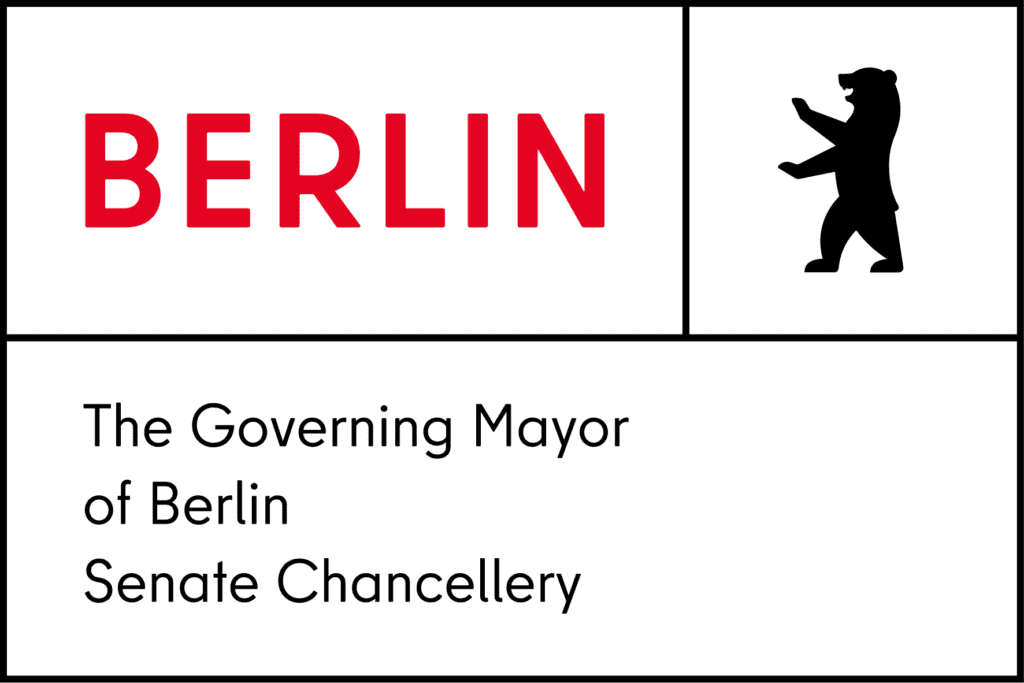As part of our work on the “Bürgeramt der Zukunft” (Citizens’ Office of the Future project), we took a close look at the daily operations and workflows in Berlin’s citizens’ offices to identify opportunities for improvement alongside the staff and test them directly. One key question was: Which workflows in the training citizens’ office can be optimized to better meet Berlin’s 14-day goal – the goal of securing an appointment at the citizens’ office within 14 days? In parts 1 and 2 of the project, we discussed how we gained valuable insights into the current challenges through a diary study and shadowing in the Ausbildungsbürgeramt Friedrichshain-Kreuzberg.
In this third part, we focus on another finding from our research phase, which we explored in depth together with Amt für Bürgerdienste Friedrichshain-Kreuzberg and the Senate Chancellery: Appointments for registration and re-registration in the citizens’ office often get canceled because documents are missing or incorrect ones are brought. How can these cancellations be reduced? To answer this question, we conducted interviews with citizens’ office staff and, based on these, developed a prototype – the “Anmelde-Check” (Registration Check) a digital checklist designed to help citizens bring the correct documents for their specific case.
Find out how we approached this and how the Anmelde-Check performed in real-life testing with citizens in this blog post!
The “Anmelde-Check” Prototype
To develop the prototype, we first looked into why documents are often missing or incomplete for citizens’ office appointments. Our hypothesis was that the current descriptions of required documents are not always easy for citizens to understand, and it is sometimes unclear which documents are needed for their specific situation. Based on this assumption, we created a use flow – an overview of different cases and the relevant information for each..
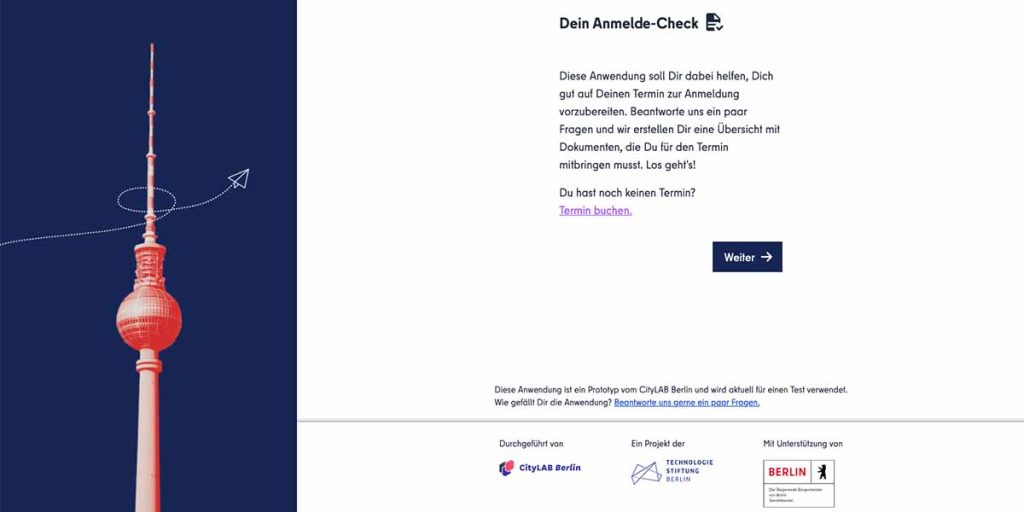
The information was then translated into questions, which are asked step-by-step in the Anmelde-Check. After answering the questions, a checklist of all required documents is displayed, which can be checked off and downloaded as needed.
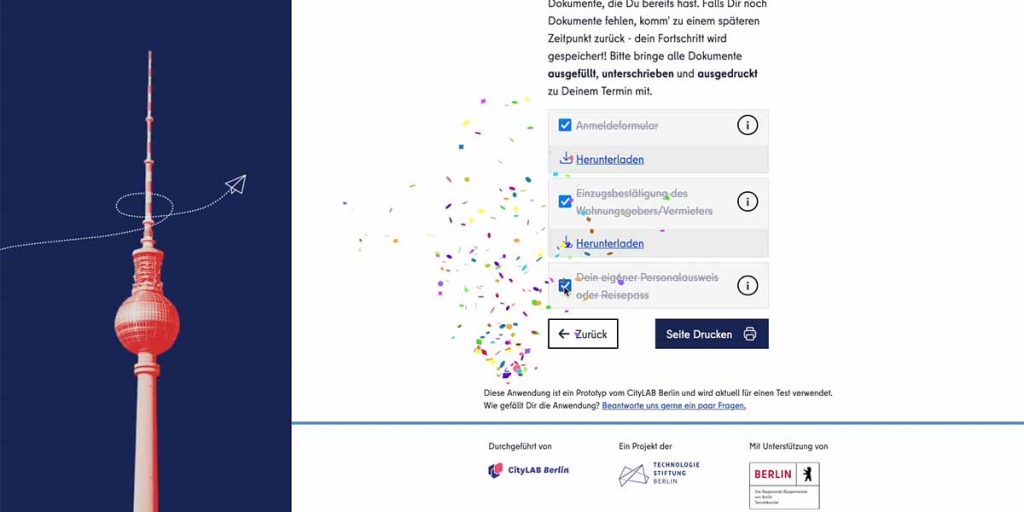
Putting Our Prototype to the Test
To test the prototype’s impact on the registration and re-registration appointment process at the citizens’ office, we organized a test week in collaboration with the Ausbildungsbürgeramt Friedrichshain-Kreuzberg. During this week, only registration or re-registration appointments were scheduled. Three days before their appointments, citizens received an email with a link to the prototype, so they could try it out beforehand. To gather meaningful data, we tracked the number and reasons for appointment cancellations both the week before and during the test week. This was done using an online tool and in collaboration with the staff of the Ausbildungsbürgeramt.
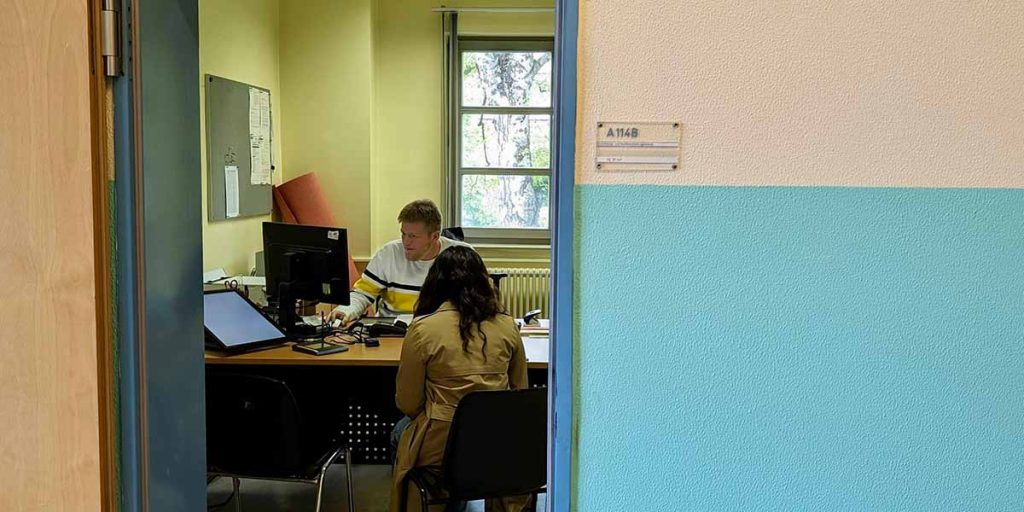
During the test week, CityLAB staff were present at the Ausbildungsbürgeramt to speak with citizens about their experiences with the prototype and find out which features were particularly helpful. At the end of their appointment, citizens were informed that a brief survey was being conducted. They were given ping-pong balls to quickly and easily vote on whether the prototype was helpful or not. This method provided an initial assessment of the prototype’s acceptance and showed who had actually used it. In total, we had conversations with 20 citizens, who shared their feedback on using the prototype.
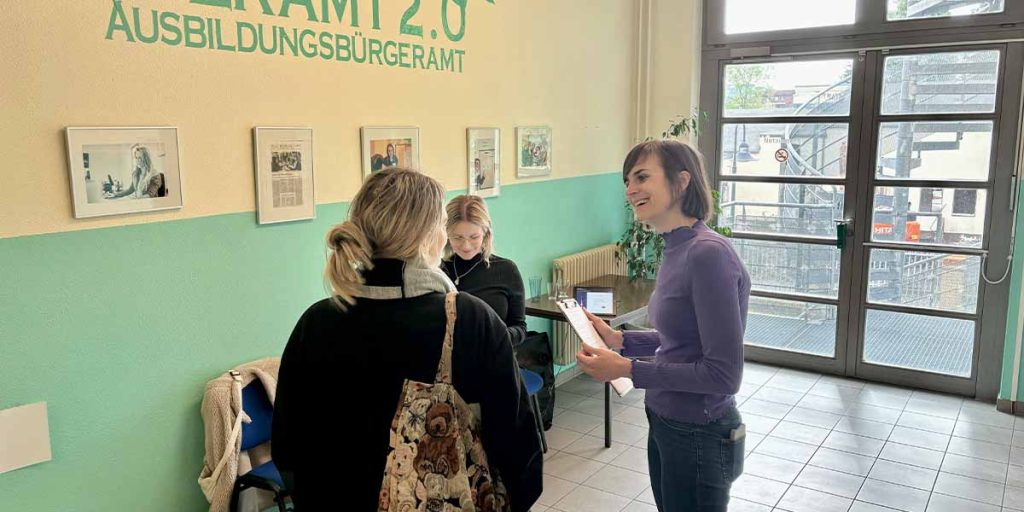
Our Findings: Analyzing the Test Phase
We are pleased to report that the feedback from citizens was mostly positive. Many found the prototype easy to understand and very helpful in preparing for their appointment. Some mentioned that they only thought of certain forms because they were listed in the prototype. In these cases, we were able to achieve our goal of reducing appointment cancellations due to missing documents. In addition, some citizens reported that the list gave them confidence that they had not forgotten anything. To gain a better understanding of the experiences, we also collected quotes from the citizens:
“Without the checklist, I would have missed a form: the registration form.”
A citizen from the survey
“I think of it more like a check-in at the airport. A bit confusing, but once you read the email, it’s clear.”
A citizen from the survey
However, we also found that the name “Anmelde-Check” was not intuitive enough and only became clear in the context of using the prototype. Since we work iteratively and make adjustments based on feedback, we decided to change the name. There were also some citizens who did not find the prototype useful, mainly those who had moved frequently in Berlin and were already familiar with the registration and re-registration process. After the test week, we evaluated the prototype’s usage through the Matomo tool. In total, 129 appointments were scheduled, and the prototype was accessed 170 times, indicating that some users consulted it multiple times. The conversion rate – the percentage of users who clicked through from the start page to the final document checklist – was 58%, which is relatively high. Usage was split between 43% on desktop devices and 57% on mobile devices. Of the seven available languages, English was chosen most often after German, followed by Spanish and Arabic.
During the test week, the number of appointment cancellations dropped from 18% to 14%. At the same time, more citizens canceled their appointments in advance if they could no longer attend – likely due to the increased attention from the additional email.
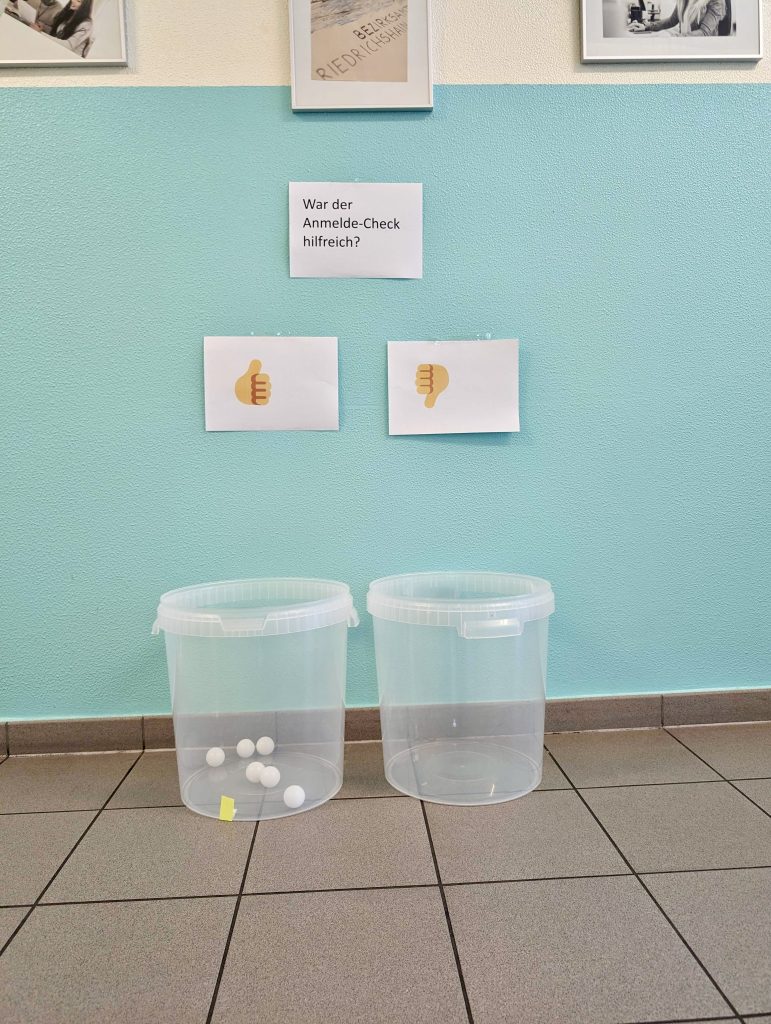
What’s Next?
“The “Bürgeramt der Zukunft” project is dedicated to testing ideas and understanding their impact on customers and processes. We focus on doing, without overthinking project structures or letting too many concerns hold us back. This prototype is a bridge between our idea and reality. Together with CityLAB, we succeeded in testing a concept to improve communication with customers, and we are excited to continue pursuing these very positive results and insights alongside the Berlin Senate Chancellery and CityLAB, and to make them a permanent part of reality.”
Oliver Kühle, Head of the Bürgerämter in Friedrichshain-Kreuzberg
As with our previous project in the Ausbildungsbürgeramt Friedrichshain-Kreuzberg, this idea was implemented based on the observations of the staff. This shows us that the valuable insights from employees are key to understanding and addressing specific challenges. Additionally, we learned that developing an early prototype is crucial to bringing an idea to life and giving everyone involved a clearer understanding of how the idea will function in practice.
We are now discussing the next steps toward potentially integrating the prototype into the existing information services with the management of the Fachbereichsleitung der Bürgerämter Friedrichshain-Kreuzbergs and the Berlin Senate Chancellery.
If you’d like to try out the prototype yourself – here’s the link to the tool!
